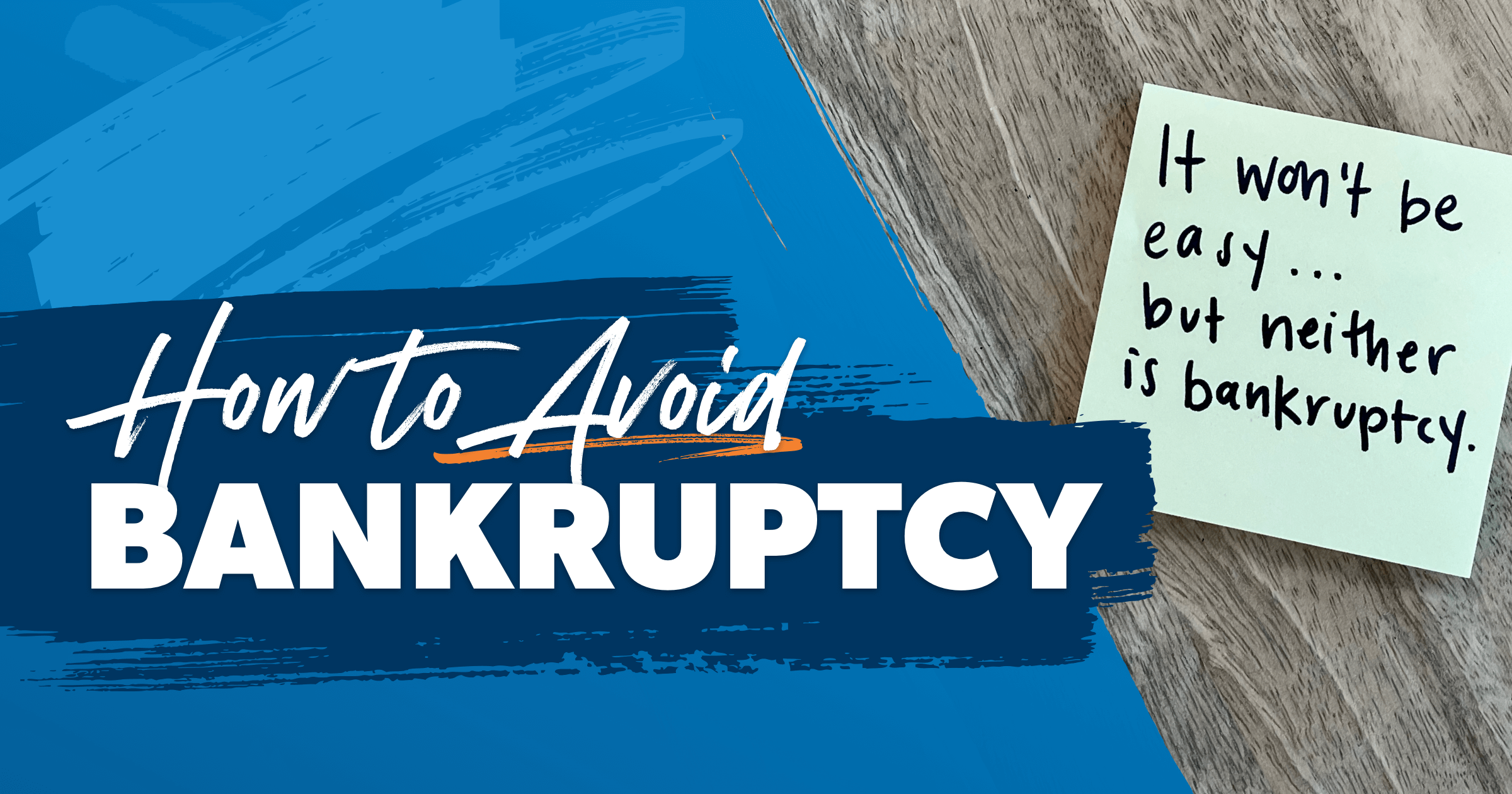
Dave’s Bankruptcy Story
What Does Filing for Bankruptcy Mean?
6 Steps to Avoid Bankruptcy
Nobody thinks filing for bankruptcy is a great idea. Even quality bankruptcy attorneys will tell you it’s a last resort. The fear, the shame, the guilt—it turns your world upside down.
If you’re considering bankruptcy right now, here are a few things you should know: First, you are not a bad person for being in this position. Second, bankruptcy is not an easy out—so avoid it if you can (we’ll show you how below). And finally, you will get through this. Seriously. That’s why we want to start off by sharing Dave Ramsey’s own bankruptcy story.
Dave’s Bankruptcy Story
Did you know Dave Ramsey filed for bankruptcy in 1988? By the time he was 26, he had a net worth of over a million dollars, but it all came crashing down when the bank called in his loans. He was left totally broke and completely broken.
That was Dave’s turning point. He said never again to being out of control with money, and he turned his financial life around (and started helping others do the same).
Wherever you’re at with your money, you can get through it. Dave’s story is proof. At one point or another, every successful person has failed—but instead of being defined by it, they learned from it. That’s how you win.
What Does Filing for Bankruptcy Mean?
If you’re thinking about bankruptcy, you need to know what it actually is. When you file for bankruptcy, you’re basically going before a judge and telling them you can’t pay your debts. Then, depending on your situation, your debts are either canceled or you make a plan to pay them back.
Now, once you file, creditors have to stop collecting money from you—at least temporarily. Most creditors can’t write, call or sue you. Bankruptcy can also stop foreclosure on your home, repossession of property, or garnishment of your wages.
But here’s the thing: Declaring bankruptcy won’t erase all of your debt. Unsecured debts like student loans, child support and IRS debt don’t qualify for bankruptcy. And although it’ll stop showing up on your credit report within seven to 10 years, bankruptcy packs an emotional punch that can stick with you a lot longer.
If you’re thinking about bankruptcy, maybe you’ve lost hope. Maybe you can't see another way out. But don’t give up—you’ve got options.
Don't Go It Alone: Connect With a Financial Coach
A trained financial coach helps you navigate your money problems and make real money progress.
6 Steps to Avoid Bankruptcy
1. Take Care of the Four Walls First
When you’re trying to crawl out of debt and avoid bankruptcy at all costs, the first thing to do is make sure you’re taking care of what we call the Four Walls: food, utilities, shelter and transportation. If you’re at rock bottom, don’t pay anyone else until these basics are covered. Keep the family fed, the lights on, the rent or mortgage paid, and the gas tank full enough to get you to work.
2. Sell Everything in Sight
You have money hanging around in the form of DVDs, TVs, boats, clothes, books, furniture, tools, office supplies, craft supplies, toys and more. Get rid of everything you don’t need. That sounds drastic, but so is filing for bankruptcy. Take the money you make and put it toward getting bills up to date. Those late fees only make things worse.
3. Live on a Bare-Bones Budget
You’re trying to avoid bankruptcy here. That means your budget has no room for frills. No streaming services, no cable, no huge cellphone plans, no dining out, and no vacations until you’re out of debt. Buy generic food, eat beans and rice, and drink water from the tap. Drink coffee you brewed yourself. And stick to your budget. Drastic times call for drastic measures.
4. Get a Second Job
These days, it’s not uncommon to hear of someone working a second (or third) job. Having an extra source of income can help you avoid bankruptcy. Just be sure you’re putting the extra income toward paying off your debts. Getting a second job will mean sacrificing time with family and friends, and we know that’s hard. But remember—this situation is temporary. Say it again: This situation is temporary. You won’t have to live like this forever.
5. Watch Out for Debt Settlement or Debt Consolidation “Promises”
With debt settlement, a debt relief company will “promise” to negotiate with your creditors to reduce the amount of debt you owe. Sounds great, right? After all, a little something beats nothing. You pay off your reduced debts and move on. Not so fast. The reality is, these debt settlement companies charge high fees for their services and don’t always deliver after you’ve paid them up front. Even worse, you’ll get stuck with more fees, additional interest payments, and a whole lot of regret. Remember, you’re in a vulnerable position, and there are people out there who will gladly take advantage of that. Don’t fall prey to slick operators who are eager to promise you a quick fix.
Get help with your money questions. Talk to a Financial Coach today!
With debt consolidation, the “promise” is that you’ll be able to pay off your debts by combining them into one (lower) monthly payment at one (lower) interest rate. And that may seem like a good option, but a lower monthly payment actually means you’ll be in debt longer. Plus, a lot of companies will lure you in with a low interest rate and then raise it over time—leaving you with even more debt. (Forget that!) We don’t recommend debt consolidation. But if you go that route, proceed with caution. Avoid anything that sounds too good to be true.
6. Talk to a Financial Coach
Sometimes it’s best to sit down and talk with a financial coach when you need guidance with money issues. Don’t let that intimidate you. Yes, talking about money is hard—but you’re in the middle of hard, and you need help. That’s perfectly okay to admit and responsible to seek out.
When looking for a financial coach, just make sure you find someone who has the heart of a teacher, a person who will walk with you and guide you along the way—not someone looking to take advantage of your situation.
Bankruptcy is not your only way out! Avoid bankruptcy and get your finances in order by connecting with a financial coach. Together, you’ll walk out of this financial wreck and into financial security once again. Book a free coaching consultation today.
Don’t face bankruptcy alone.
Walk through this with a coach at your side. Book a complementary coaching session today.
Talk to a Coach Today


